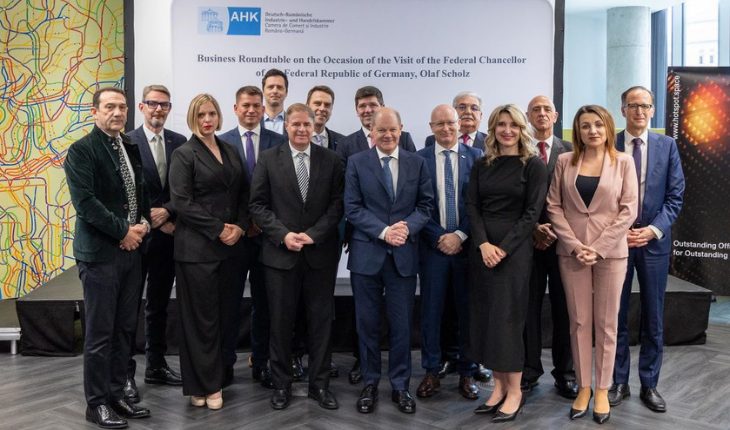Leading German companies in Romania presented on Saturday a series of proposals on how to leverage better on the business potentials that Romania is offering and how to improve overall business framework on European level, during the meeting with the Chancellor of the Federal Republic of Germany, Olaf Scholz, on Saturday. The round table organised by the AHK Romania at its premises brought together representatives of the companies in sectors like energy, research & development and innovation, automotive, defence, digitalisation, agriculture and retail.
“Germany and Romania share a close trading and investment relationship. Germany is Romania’s largest trading partner and investor and we are proud that the relationship continues to thrive. With the German-Romanian Cooperation Council we are creating a new economic affairs platform to connect our businesses with a project-based approach to find more exciting business opportunities for both sides. It’s a success story that we hope to see growing even stronger in the future”, said Chancellor Scholz on this occasion.
Sebastian Metz, General Manager & Board Member of AHK Romania and moderator of the round table noted that Romania is currently undergoing a challenging economic transformation process making it a greener and more digital business location.
“AHK Romania is part of this transformation process and we would like to dive into this transformation dialogue between Germany and Romania, to see what the perspectives of our bilateral relations are,” added Sebastian Metz.
At his turn, AHK President Andreas Lier said that new investment announcements are being seen almost every week. He mentioned some reasons why it is happening: steady economic growth in recent years (3 to 5% growth rates), attractive location with diversified economy, strong industries such as automotive (Romania is the sixth largest automotive nation in Europe, ahead of Italy and Hungary), energy, IT, agriculture, talented and well-educated workforce, EU and NATO membership etc.
“It is important that the framework conditions on the national and European context are further developed to leverage full opportunities,” he concluded.
The managers of the companies told Chancellor Scholz that they are satisfied with their activity in Romania but expressed their needs for the business improvement.
On the energy & gas topic, the representatives of the companies said that investments in this field are very attractive, as Romania has gas reserves for a couple of decades, which will serve as basis, together with the hydrogen, for the green transformation of the energy production. However, due to the speed of the renewables’, whose production capacity is expected to grow in the next 10 years, more time and especially investments are needed to prepare the grid to absorb the available energy. Therefore, they called for a more investment-supportive regulatory energy framework. Furthermore, digital solutions are highly needed to address problems related to cyber security, especially in the context of the war deploying at the Romanian borders.
Companies active in R&D expressed their concern regarding potential tax increases, due to the high deficit in the state budget. If this happens, the technology sector will be highly affected. They have also called for better regulations at EU level for example on protection of vehicle data.
Companies in the field of digitalisation would like to see more consideration for the innovation technologies at the EU level, in terms of capital expenditure.
’’We would love to see an approach where new instruments are being discussed to further drive innovation, technology and AI. Maybe there can be a consideration at the EU level to think about either to have preference or tiny funds allotted for the European companies or to facilitate opening up the markets,” they requested.
The food sector in Romania is developing and needs as well lots of investments, if Romania aims to import less from abroad. One of the areas concerned is the irrigation network, as the Eastern side of the country is affected by drought, putting 5% of the total agricultural production at risk. Furthermore, they added that there are business opportunities for German companies to invest in food processing in Romania.
All companies representative underlined the importance of a predictable fiscal legal framework even after this election year 2024.
